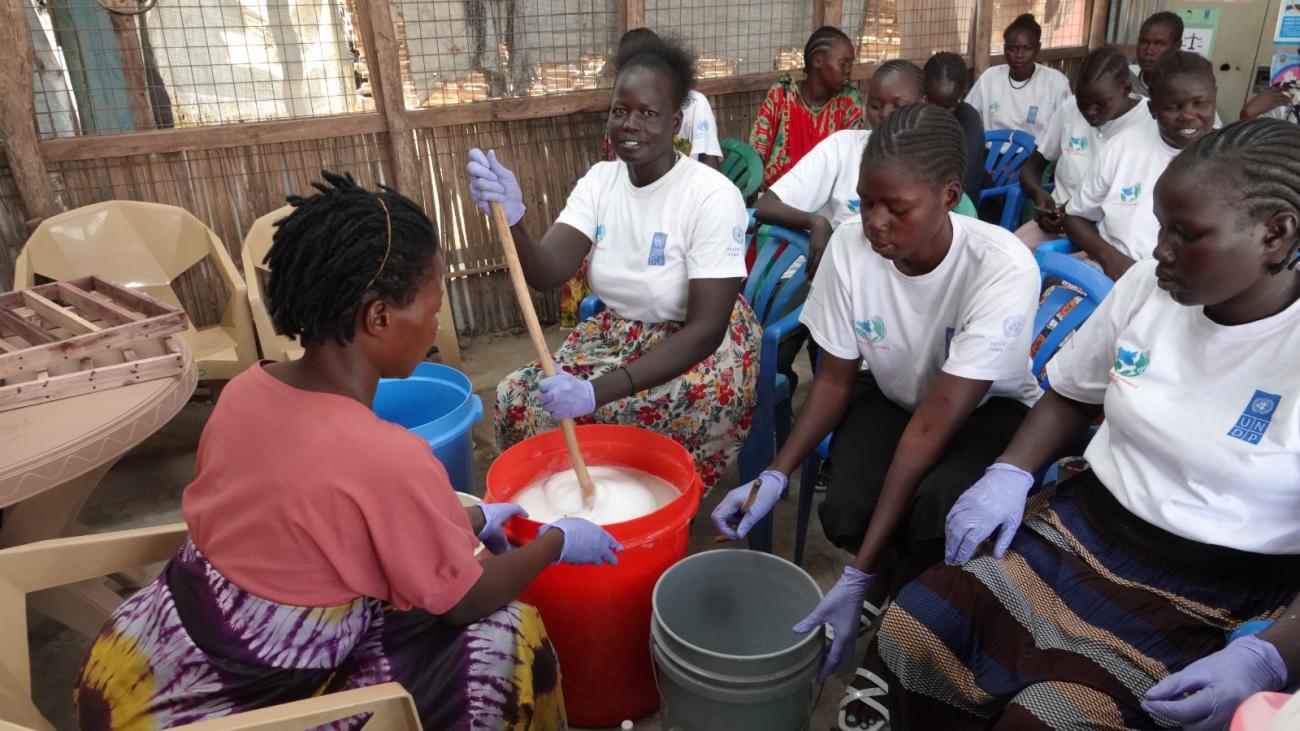Nyagai’s Journey to Restored Dignity

This project has transformed the lives of displaced women living in Mangaten camp through the provision of psycho-social healing services.
Elizabeth Nyagai Bol was born with a disability that affects her leg function, requiring her to use her hands for mobility. At 31, she carries herself with quiet dignity despite the hardships she endures.
When we met at the Mangaten camp for the Internally Displaced Persons (IDPs), Elizabeth wore a white Peacebuilding Fund (PBF) branded t-shirt and a floral skirt, moving gracefully and confidently. She stood out as a natural leader in her group, setting the pace during the soap-making process.
Elizabeth is one of the 33 women that make up the victim support group which is benefitting from the Transitional Justice project. With funding from by the United Nations Secretary General’s Peacebuilding Fund, the project was implemented by the United Nations Development Programme (UNDP), in partnership with Vision for Humanity and the Kingdom of Netherlands.
This project has transformed the lives of displaced women living in Mangaten camp through the provision of psycho-social healing services. The project also offers training in practical skills, such as basket weaving and the production of various personal care items including shampoo, bar soap, liquid soap, and moisturizing jelly – which in turn improved the overall economic wellbeing of the people living in Mangaten.
Their products sell quickly, particularly to fellow camp residents who appreciate not having to travel to distant markets. For each sale, 50% is re-invested into the group, while 50% is distributed among the participants, which is used to contribute to their families’ wellbeing.
When they receive psychosocial trauma healing services and training, the participants go into the community and teach others, creating a ripple effect that encourages healing in the camp. The training on basic human rights and transitional justice has built their self-esteem, making them confident to support each other in the community.
For Nyagai, these new skills have been particularly transformative, turning her story of hardship into one of resilience and leadership. After losing her husband in the 2016 conflict, she faced severe discrimination because she was now a widowed person with disability. During displacement, she was nearly abandoned, deemed "worthless" by some. Yet this mother of two refused to give up.
Today, she confidently provides direction in the soap-making sessions, showing no signs of being limited by her disability.
"Before this project, I faced constant discrimination and was told I had nothing to offer society," Elizabeth explains. "Now, the same people who discriminated against me come to me for advice."
In the small roof-covered workspace where the scent of essential oils fill the air, Elizabeth can be seen confidently demonstrating the proper soap mixing technique. Her hands move with practiced precision, stirring the mixture in a large plastic basin.
The transformation extends to her family life as well. Previously unable to afford her children's school fees or basic necessities, Elizabeth can now provide for her family and ensure her children's education.
"Through this project, I've helped break the chain of discrimination in our community," she says. "I can now advocate for other Persons with Disabilities (PWDs) with confidence."Judith Agang, the Executive Director at Vision for Humanity, recalls a particularly moving milestone: when Nyagai earned enough to pay her children's school fees for the very first time.
"She invited me to accompany her to the school, wanting me to witness firsthand the project's impact on her family's life," Agang shares. "Watching her proudly pay those fees - something she had never been able to do before - brought me to tears. These are the transformative moments that give meaning to our work," she reflects, her voice filled with emotion.
Elizabeth's story shows how dignity can be restored in unexpected ways. Through initiatives like the Peacebuilding Fund, the United Nations in South Sudan demonstrates that lasting peace requires more than political solutions. It demands restoring dignity through providing opportunity to conflict survivors.
Looking ahead, she hopes to continue advocating for women in her community, especially those who find themselves in unfair situations.
“I dream of a time when we can integrate this project with a Gender-Based Violence initiative so that we can put an end to the suffering from forced marriages, discrimination and GBV.”- she says, her eyes bright with determination.
When women rise, communities transform. The PBF Transitional Justice project continues to equip women with skills and support, turning formerly displaced people into powerful changemakers, while contributing to the overall priority of addressing conflict related to displacement.










